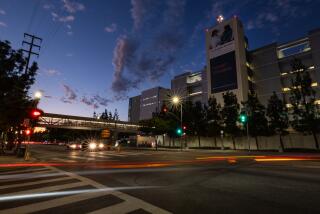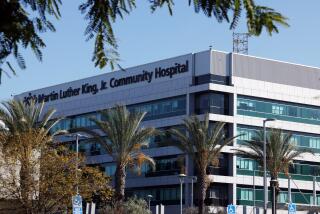Hospital Uses Metal Detectors to Screen Arms : Cites Gang Violence, Threats to Medical Staff
- Share via
Metal detectors have been installed this week at two key entry points to Martin Luther King Jr./Drew Medical Center in Watts to screen out weapons carried into the hospital by growing numbers of “violent and unruly individuals,” hospital officials said Wednesday.
Up to 60 gang members at a time have converged on the 430-bed county hospital to visit their wounded friends or to intimidate rivals, said Robert Eason, the hospital’s chief of safety police.
They have barged into the emergency room, camped outside the third-floor operating rooms and marched up to the fifth-floor pediatrics ward, where people under 17 are treated, Eason said.
‘Scared to Work Here’
“People are scared to work here,” said Bob McCloskey, business agent for Local 660 of the Service Employees International Union, which represents nurses and other medical personnel at King. “The gang-bangers who come here are interested in seeing their partners live or their enemies die.”
Nurse Ethel Edmond recalled treating a patient about a year ago when his friends suddenly barged into the emergency room and threatened: “If he dies, you die.”
Edmond said she shot back: “If you really want to save your friend, go give some blood.” They did.
Tension in the emergency room escalates, Edmond said, “when rival gang members are in the emergency room at the same time. That’s when the problems start. . . . Gangs come in to see how a member is or to retaliate.”
Hospital administrator William Delgardo said that so far “there has never been a shooting on the grounds.” He called the metal detectors an “ounce of prevention.”
Eason said several Veterans Administration hospitals are protected by metal detectors, as is the psychiatric hospital at County-USC Medical Center.
Usually, Eason said, the safety officers at King are able to handle confrontations. But about a year ago, he said, gang members put the hospital under virtual siege.
He recalled that about five carloads of gang members arrived at the hospital and converged suddenly on the lobby of the emergency room.
“We couldn’t catch them,” Eason said. “They outnumbered us three to one. It happened so fast we had to ask the sheriff to bring help.”
‘Terrorizing People’
Edmond recalled, “They were terrorizing people in the waiting room and they stole a janitor’s cart.”
The sheriff arrived with helicopters, cars and dogs. King personnel were ordered not to leave the hospital, and paramedics with other patients were directed into the hospital through a back door.
In a bulletin issued this month to King personnel, Eason stated: “Our psychiatric and emergency rooms have been inundated with unruly and violent individuals that have caused considerable concern for personal safety. . . . The acquisition . . . of metal detectors will enable us to detect and progressively deter the presence of objects which are . . . used as weapons.”
“It’s real scary working here,” Edmond said. “Safety has been an issue for a long time.”
Eason said that he ordered three metal detectors two years ago but that they were delayed by budget problems.
Two detectors--each costing about $4,000--have just arrived. One has been set up at the entrance to the Augustus F. Hawkins Mental Health Building, which houses several out-patient psychiatric treatment programs and four in-patient wards. The other has been set up at the entrance to the pediatric wards, which have about 50 beds. They will be operative next week.
Remodeling Necessary
A third metal detector is on order for the emergency room, Eason said. But the area will have to be substantially remodeled to accommodate it.
Edmond said that a metal detector for the emergency room would be “heaven. . . . It would be great.” She said that patients have stashed butcher knives and other weapons in drawers in the emergency room. A few months ago, she said, a deranged man was apprehended in the emergency room lobby waving a gun.
Safety concerns have made it extremely difficult to recruit nurses needed to fill more than 90 vacancies, she added.
More to Read
Sign up for Essential California
The most important California stories and recommendations in your inbox every morning.
You may occasionally receive promotional content from the Los Angeles Times.













